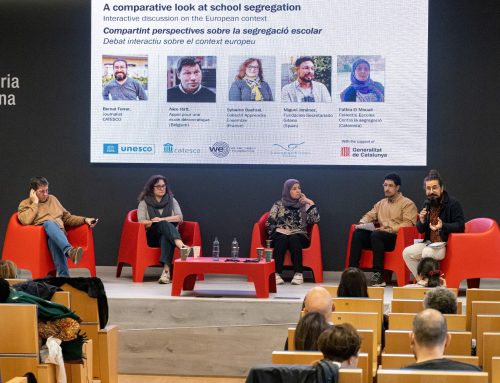Over 130 countries committed this past September in New York to restart their education systems and to act urgently to alleviate the learning crisis caused by the Covid-19 pandemic.
The Transforming Education Summit is one of the key initiatives of Our Common Agenda, an agenda promoted by UN Secretary-General António Gutérres to accelerate the implementation of existing agreements, such as the SDGs.
The relevance of this summit, and of the subsequent commitments acquired by the states, lies in the fact that the United Nations, by the hand of its Secretary-General, adheres to UNESCO’s calls to make education the key for the achievement of the 17 SDGs and at the same time promote the achievement of SDG 4. Quality education. “In order to redeem and remake the state of the world, we must first transform the state of education” states the Youth Declaration presented at the summit, in which the voices of almost half a million young people from all over the world were reflected.
In line with the achievement of these objectives, -António Gutérres warns that “instead of being the great facilitator, education is quickly becoming the great divider“ and calls on countries to urgently address the learning losses in children and young people resulting from the pandemic. However, he also stated that this must be done without resorting to past solutions, but by rethinking and globally transforming educational systems and revaluing the status and prestige of education.
This educational crisis, which the pandemic has only made evident, requires rethinking the purpose of education and the curricula themselves, as UNESCO clearly suggests in its global education report Reimagining our futures together: a new social contract for education. But it also requires states to invest more, more equitably and more efficiently in education: half of the world’s countries have cut their education budget due to the pandemic and less than half have strategies to help children and young people recover learning lost during this period of time. If not tackled properly, this situation will seriously contribute to the perpetuation and increase of inequalities, however, addressing it requires an unprecedented educational investment.
As a result of the summit, almost half of the participating countries have committed to prioritizing education by taking action to address learning losses, while a third have done so in terms of their support for the psychosocial well-being of learners and teachers. In short, more than 130 countries have committed to restarting their education systems and to back on the transformation of education as a lever for transforming the world. While, for its part, the United Nations has reaffirmed its commitment and leadership for the achievement of these objectives.










